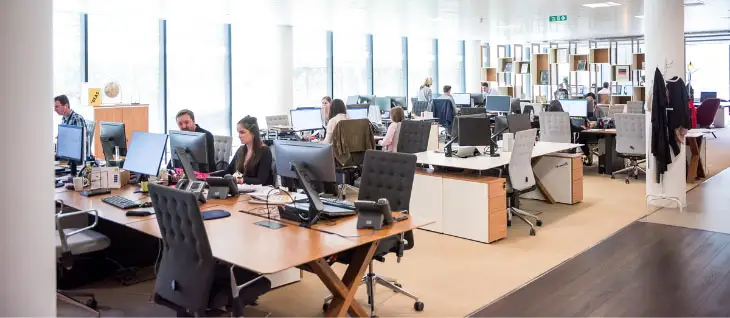Prepare your workplace for the new world of working
The world of work has changed for good in the last 12 months and with workers becoming accustomed to remote working it is going to take workplace leaders some concerted effort to entice
Read more
The way we work changed dramatically in 2020 – but how many of the changes will stick as the world escapes the pandemic?
International workplace software experts NFS Technology recently asked 30,000 FM professionals and C-suite executives for their opinions – and what workspace decisions they plan to make.
NFS, who provide the Rendezvous Workspace meeting room and desk booking system to over 1000 clients worldwide, carried out the survey to provide important pointers for workspace leaders trying to stay ahead of the game.
“In this time of great workplace evolution, making robust workplace plans and decisions depends more than ever on having the right data,” said Luis De Souza, CEO of NFS Technology.
“Robust meeting room and desk booking software can provide the granular data to support good planning decisions.
“The accelerated move to home and agile working, and the increased emphasis on safety and wellbeing, are creating new and evolving demands. These require careful handling if productivity, creativity and talent retention are to be maintained.
“The fascinating results of our survey – which include some surprises – provide valuable information to help workspace professionals with their plans and actions for #Workplace2021.
Respondents ranged from senior facilities heads to CIOs, CEOs and Managing Directors. 6% of the 100 respondents were from the C Suite.
Companies represented included international law firms, major banking institutions and global IT companies and others.
Headline findings
Impact on space:
56% indicated no change in space profile. Why?
34% are looking to reduce space, the majority by over 25%. Why?
“Many organisations have shifted successfully to flexible working during the pandemic, and this is encouraging workplace leaders to rethink the way they use their space.
“Desk sharing and hoteling will become increasingly part of the workplace strategy, and meeting spaces will become Teams/Zoom-enabled collaboration hubs.” – Luis De Souza
55% say agile working will increase in 2021
“Respondents believe a successful 2021 workplace will combine different workplace types, aligned to tasks and collaboration needs.
“With the workplace becoming increasingly agile, respondents rated desk utilisation information No 1 in terms of critical data – yet there is a worrying lack of clarity on how to capture and analyse it to support space planning.” – Luis De Souza
46% say the Board set the direction of workplace change
Others contributing to decisions are:
“Given the increased concerns about worker wellbeing – and its impact on productivity, recruitment and retention – it’s surprising functions such as HR and CRE are not playing a more strategic planning role. We need to holistically address fundamentally changing issues such as: ‘What is the purpose of a meeting room?”. – Luis De Souza
57% say technology will be a key workplace driver in 2021
Other drivers are:
Technology – it’s foundational
“Technology is no longer a catalyst in the workplace – it’s foundational,” said Luis.
“Clearly, meeting room and desk booking software supports all the other drivers to change respondents, providing an easy answer to the question: ‘How do I reserve a meeting room?’. But the results prompt questions about the way workplace leaders think about technology.
“It was surprising that IoT, occupancy sensors and wayfinding – all important creating an efficient agile workplace – were not top investment priorities.
“The big questions around connected technology and a more holistic approach to technology deployment did not seem critical factors. We believe workplace leaders need to make a significant shift in their strategic thinking.”
But Luis warned that while technology is important in the evolved workplace, it is not a panacea for all ills.
“There is broad consensus that we need to avoid stifling creativity as we build the new workplace,” he said.
The top 6 challenges workplace leaders are facing
1. Overcoming employees’ safety concerns about returning to the office
2. Identifying what their organisation wants from its workspace
3. Curating home and remote working for productivity and collaboration.
4. Planning for wellness to promote productivity and retain talent
5. Building agile teams that collaborate in new ways
6. Handling visitors to this agile workplace efficiently
Technology solutions
“Technology such as a meeting room and desk booking system provides solutions to these key challenges in a number of ways,” said Luis.
“It streamlines the agile workforce journey – staff can co-ordinate home, remote and office-based working by booking desks and meeting spaces via an app and graphical floorplans. This creates good organisation and an efficient working day.
“Meeting spaces can become now Teams/Zoom/ WebEx enabled spaces catering for both in-house and external attendees, and multi-location events can be organised in a few clicks, even across time zones.
“The meeting room and desk booking software also integrates with other systems and technologies such as Outlook and digital signage, and with sensors that provide the desk and room utilisation data that is so prized yet currently so hard to come by.”
In these times of Covid, technology including QR codes provides contactless check-in and out, plus safe and secure visitor management.
Conclusion
Luis said: “The Workplace 2021 Survey has provided a valuable insight into the thinking of workplace leaders world, and it’s clear that any successful future workplace strategy will be driven by technology.
“Our workplaces will never look the same again – and we will use them in new ways. Workplace leaders who want to build and retain a talented, productive team must respond to this constantly.
“The secret of success lies in taking the elements of change and making them fit with the culture, size of business and workplace you have in mind for your organisation.”
Luis De Souza explains the survey findings